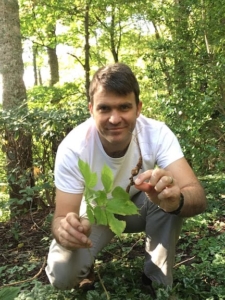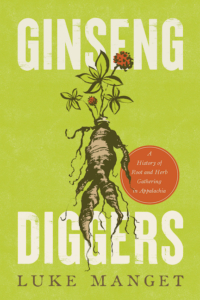A Fight Over the Mountain Commons
Ginseng Diggers traces the history of Appalachia’s root and herb trade
In the 19th century, large numbers of people living in southern and central Appalachia supported themselves to varying degrees by harvesting herbs, roots, and other medicinal botanicals that grew wild in the mountain woodlands around them. These “sang diggers,” as they were colloquially known, and the story of their importance to the global botanical pharmaceutical trade are the focus of Luke Manget’s Ginseng Diggers: A History of Root and Herb Gathering in Appalachia.
 Simultaneously demonized and romanticized, these root and herb diggers became a flashpoint in an ongoing conflict over the use of what is known as the mountain “commons.” Digging became “an aspect of mountain life to be ridiculed or ignored,” Manget writes. “Telling this story, therefore, requires overcoming this bias in the historical record.”
Simultaneously demonized and romanticized, these root and herb diggers became a flashpoint in an ongoing conflict over the use of what is known as the mountain “commons.” Digging became “an aspect of mountain life to be ridiculed or ignored,” Manget writes. “Telling this story, therefore, requires overcoming this bias in the historical record.”
A historian whose Kentucky “family of root diggers and herb gatherers” instilled an appreciation for the importance and pleasures of the trade, Manget comes by his subject honestly. His book provides crucial missing pieces of this previously misunderstood and undervalued aspect of the region’s history and economy.
Much of Ginseng Diggers hinges on the concept of the “commons.” Manset defines the botanical goods that diggers foraged as “commons commodities,” and he carefully outlines the Appalachian iteration of this idea, delineating a number of arguments about its economic evolution. He offers a thorough and nuanced discussion of this particular form of capitalism, providing a unique lens through which to understand how the diggers’ work became so controversial.
Published at the same time that Tennessee has become the first state to make camping on both state and local public land a felony, Manget’s study of previous eras’ debates over use of common spaces — and the evolution of the laws surrounding that debate — feels especially timely.
 In early chapters, Manget traces the overall history of the botanical pharmaceuticals trade, global and domestic, but with special focus on Chinese markets. Manget goes on to chart the rise and eventual decline of Appalachia’s prominence in the botanical drug trade, with focus on the Civil War’s profound effect on numerous aspects of the region’s economic realities and attitudes toward land use.
In early chapters, Manget traces the overall history of the botanical pharmaceuticals trade, global and domestic, but with special focus on Chinese markets. Manget goes on to chart the rise and eventual decline of Appalachia’s prominence in the botanical drug trade, with focus on the Civil War’s profound effect on numerous aspects of the region’s economic realities and attitudes toward land use.
Subsequent decades saw radical changes in botanical trades, and Manget’s discussions of the fallout of these crucial shifts are clear and enlightening. After a considerable boom in these markets — which included a huge range of plants, ginseng being the most lucrative — business began to cool.
Deforestation, population growth, and concerns about overharvesting contributed to a growing skepticism in the region about the legitimacy of commons commodities. Once power swung toward the demands and agendas of landowners, larger swaths of commons territory were enclosed, and penalties for foraging mounted. As a result of these changes, ginseng became privatized as a commodity. The importance of the region’s history of communal foraging was minimized or erased altogether, with diggers themselves slammed as “beasts in the garden.”
The book’s final chapter explores the cultural image and mythologizing of the “sang digger,” a favorite of 19th-century journalists and novelists whose narratives had something to say about “the dichotomy between savagery and civilization.” Such writers played into racial and gender stereotypes, and the sang digger myth “was nurtured by ignorance, cognitive dissonance, and capitalist goals until it grew to the point of pure fantasy.”
Tagged as “shiftless and lazy,” hostile to cultural institutions like marriage, threatening to modernization and the rule of law, and — in the most surreal newspaper accounts — even cannibalistic, the sang digger represented a “cautionary tale” that proved useful to numerous (sometimes competing) cultural and economic movements.
Like Jessica Wilkerson’s study of Appalachian women devoted to social justice and labor activism, To Live Here, You Have to Fight, and the indispensable, wide-ranging anthology Appalachian Reckoning, Luke Manget’s study joins a number of books in recent years that challenge reductive narratives about Appalachia’s cultural and economic history. Ginseng Diggers belongs in any library of books devoted to this necessary course correction.

Emily Choate is the fiction editor of Peauxdunque Review and holds an M.F.A. from Sarah Lawrence College. Her fiction and nonfiction have appeared in Mississippi Review, storySouth, Shenandoah, The Florida Review, Rappahannock Review, Atticus Review, Tupelo Quarterly, and elsewhere. She lives near Nashville, where she’s working on a novel.


